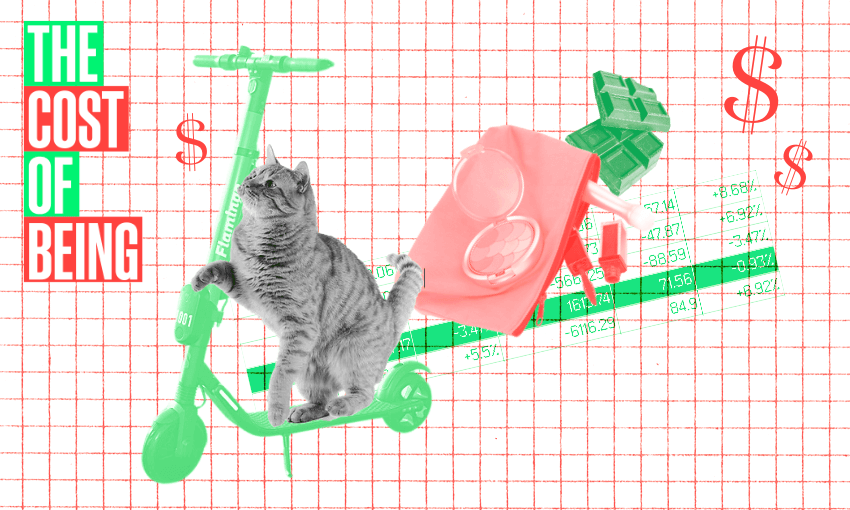As part of our series exploring how New Zealanders live and our relationship with money, a 23-year-old explains why she’s been working since she was 11.
Want to be part of The Cost of Being? Fill out the questionnaire here.
Gender: Female.
Age: 23.
Ethnicity: Cambodian Chinese.
Role: Barista, tutor, campaigner, student and mental health support person.
Salary/income/assets: $595 per week after tax.
My living location is: Urban.
Rent/mortgage per week: $490 per week for a one-bedroom flat in Hataitai, Wellington. I split this equally with my partner ($245 each).
Student loan or other debt payments per week: Student loan repayment: $20 a week.
Typical weekly food costs
Groceries: $80 groceries.
Eating out: $30.
Takeaways: Included in the eating out allowance.
Cafe coffees/snacks: $30, includes random workday lunches.
Other food costs: Cat food for my cat: $5 per week.
Savings: I try to save at least $100 a week for general emergencies. For every $500 I save I allow myself to spend on something I’ve been wanting for a while. Recently I’ve been saving for new piercings and my first ever expensive eyeshadow palette. My emergency savings is always at least $1,000.
I worry about money: Always.
Three words to describe my financial situation: Careful and bare minimum.
My biggest edible indulgence would be: Salmon.
In a typical week my alcohol expenditure would be: $0.
In a typical week my transport expenditure would be: $10 bus, $10 Flamingo scooters.
I estimate in the past year the ballpark amount I spent on my personal clothing (including sleepwear and underwear) was: $200.
My most expensive clothing in the past year was: My keffiyeh because #freepalestine, which was $42.
My last pair of shoes cost: $100 for Portuguese leather boots off Facebook Marketplace.
My grooming/beauty expenditure in a year is about: I literally still use the mascara I bought two years ago and don’t really wear makeup so annual cost would be like $60. This would include basic skincare like sunscreen and face wash, maybe a new eyeliner every now and then and like $15 worth of hair dye and bleach.
My exercise expenditure in a year is about: $100 uni gym membership but I never go lol.
My last Friday night cost: $10 for Whittaker’s block chocolate and a kombucha because I stayed in.
Most regrettable purchase in the last 12 months was: First ever not-at-home haircut which cost me $120 and I hated it.
Most indulgent purchase (that I don’t regret) in the last 12 months was: $350 tattoo.
One area where I’m a bit of a tightwad is: Kitchen utensils and crockery.
Five words to describe my financial personality would be: Indulgent, disciplined, resourceful, anti-capitalist, local.
I grew up in a house where money was: Tight. My parents were hard-working immigrants but didn’t find much success because of poor financial habits. My dad was stupidly overindulgent. My mother then became a single mother supporting two kids on her own and I started working at the age of 11 to help out.
The last time my Eftpos card was declined was: Never because I’m too stressed about money to be caught without some.
In five years, in financial terms, I see myself: Stable and rich with supporting local businesses. I hope that renting conditions will be better in New Zealand because I refuse to buy a house #landback. There are plenty of progressive countries who have amazing state-housing programmes or decades-long leases, where housing is not treated as a business but an essential right.
I would love to have more money for: Supporting local artists and musicians.
Describe your financial low: My financial low was probably having to work full time as a kid during the school holidays so I could afford to buy a new uniform for school or a laptop for my education. Even though some things weren’t necessary I felt that they would help me achieve success and so I worked really hard at the cost of my mental health and social wellbeing. I’m still really isolated at times because I have so much trauma around financial insecurity that I barely have time for a social life. I feel that it shouldn’t be so difficult to work enough to have a balance of life and actually contribute to the local economy like going to shows and eating at restaurants. Working full time just to pay rent and utilities is not really living.
I give money away to: Whānau when they need it and my partner when they are struggling. I occasionally give to Givealittle campaigns.
